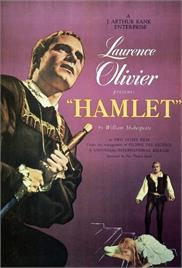Be Careful of Fake Websites. Always use HindiMovies.to domain & Join our Telegram Channel for Latest Updates.

Likes: 7
Views: 2.84K
William Shakespeare’s tale of tragedy of murder and revenge in the royal halls of medieval Denmark. Claudius, brother to the King, conniving with the Queen, poisons the monarch and seizes the throne, taking the widowed Gertrude for his bride. Hamlet, son of the murdered King, mournful of his father’s death and mother’s hasty marriage, is confronted by the ghost of the late King who reveals the manner of his murder. Seeking revenge, Hamlet recreates the monstrous deed in a play with the help of some traveling actors to torment the conscience of the evil Claudius. In a visit with his mother, Hamlet expresses his anger and disappointment concerning her swiftly untimed marriage. Thinking a concealed spy in his mother’s chamber to be the lurking Claudius, he mistakenly kills the meddling counselor, Polonius, father of Ophelia and Laertes. Claudius, on the pretext that Hamlet will be endangered by his subjects for the murder of Polonius, sends the prince to England.
Duration: 155 min
Released: 1948
IMDb Rating: 7.9/10 (9,822 Votes)
Genre: Drama, Dubbed Movies
Stars: Anthony Quayle, John Laurie, Esmond Knight, Niall MacGinnis
Directors: Laurence Olivier
Writers: William Shakespeare
Year: 1948
Hamlet (1948): A Cinematic Masterpiece by Laurence Olivier
The 1948 film Hamlet, directed by and starring the renowned British actor Laurence Olivier, is a landmark adaptation of William Shakespeare's iconic tragedy. This film stands out not only for its remarkable interpretation of the classic play but also for its pioneering contribution to Shakespearean cinema. A blend of dramatic intensity, exquisite performances, and masterful direction makes this movie a timeless masterpiece that continues to be celebrated decades after its release.
What is this movie about?
Based on William Shakespeare's play of the same name, Hamlet (1948) tells the tragic story of Prince Hamlet of Denmark, who is deeply affected by the sudden death of his father, King Hamlet. Compounding his grief is the swift remarriage of his mother, Queen Gertrude, to his uncle Claudius, who has now ascended to the throne. Hamlet's world spirals into turmoil when he encounters the ghost of his deceased father, who reveals that he was murdered by Claudius. Consumed by vengeance and inner conflict, Hamlet embarks on a suspenseful and psychologically rich journey that explores themes of betrayal, madness, morality, and revenge.
The film captures the complex emotional and philosophical dilemmas faced by Hamlet, delving into his vacillation between action and thought, his feigned madness, and his interactions with other key characters such as Ophelia, Polonius, and Horatio. The rendition remains faithful to Shakespeare's original text, while employing cinematic techniques to enhance its dramatic impact.
Main Actors and Their Roles
These and other supporting actors contribute to a richly woven narrative that brings Shakespeare's characters vividly to life.
Director and Writer
Laurence Olivier served as both director and leading actor, a dual role that underscores his profound dedication to the project. His vision was instrumental in translating the complex poetic drama of Shakespeare into a cinematic form that was accessible without losing its literary richness. Olivier's direction is notable for its atmospheric lighting, inventive camera work, and selective emphasis on key dialogues that enhance the tension and emotional weight of the scenes.
The screenplay is adapted from William Shakespeare's original play, with Olivier and his collaborators carefully condensing the text to fit the medium of film while preserving its core themes and language. This considered adaptation helps sustain the essence of Shakespeare's tragedy while making it engaging for a mid-20th century audience.
Significance and Legacy
The 1948 version of Hamlet is notable for being the first British film to win the Academy Award for Best Picture and Laurence Olivier won the Oscar for Best Actor for his role. The film also received the Oscar for Best Cinematography and Best Art Direction, among several other nominations, reflecting its high artistic standards.
Olivier's interpretation has been praised for capturing the psychological tension of the play and bringing Shakespearean drama to the silver screen in a way that was both respectful and innovative. The movie remains a crucial reference point for actors, directors, and scholars interested in Shakespearean adaptations and classic cinema.
Conclusion
The Hamlet (1948) film stands as a testament to the enduring power of Shakespeare's work and the artistic vision of Laurence Olivier. Its compelling performances, faithful yet cinematically savvy adaptation, and historic accolades make it an essential viewing experience for lovers of Shakespeare, drama enthusiasts, and film historians alike.
For those interested in exploring this classic, the film is readily accessible and remains a benchmark for quality Shakespearean cinema.